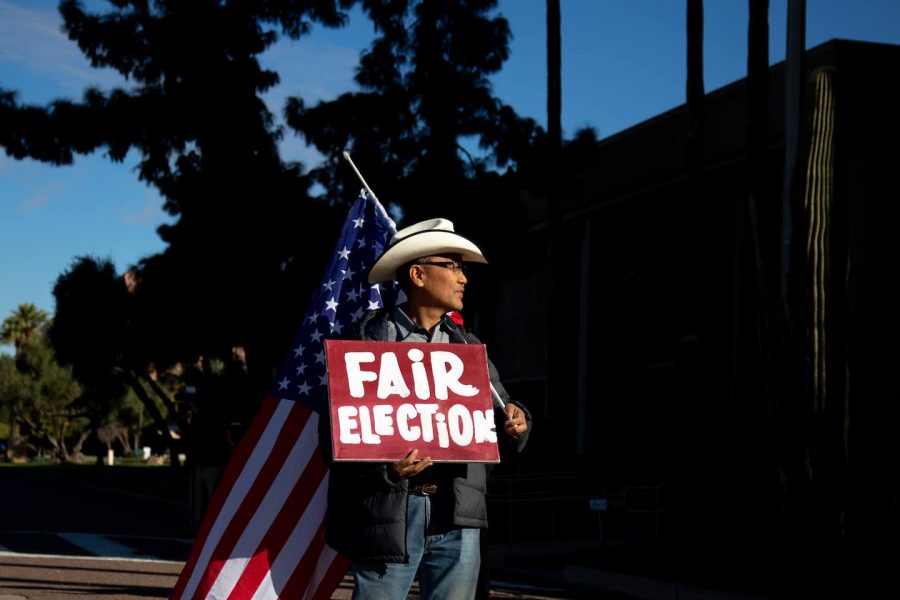Arizona Election Recount Exemplifies American Polarization
The 2020 election was shocking in many aspects; the closeness in results and the events that occurred post-election were certainly unheard of. The election results highlighted our extremely divided and polarized country. Now, six months later, election results are still being contested by some Republicans in the state of Arizona.
Since the release of the Nov. 7, 2020 results, the United States has faced a lot of anguish due to the presidential transition. Conspiracy theories, court cases and hostility from far-right groups have led to deadly events such as the Capitol riot in January 2021.
The refusal to accept the election results shows that some radicalized people in both parties are stuck in their beliefs, inhibiting them from accepting the facts at hand. The election results furthered radicalized ideologies. The call for election recounts in Arizona right now is threatening for many people, as it may spark other dangerous events.
The 2.1 million ballots cast in Maricopa County, Arizona, are scheduled to be recounted, per an order from the Republican-led state Senate.
Karen Fann, the Senate President in Arizona, put together a team to audit the 2020 election results in Maricopa County. Fann and some other Senate Republicans in Arizona put together a three-page document showcasing citations of election fraud.
After an initial pause due to Democrats filing a lawsuit to cease the recount, an Arizona judge required that the Democratic Party post a $1 million bond to cover the pause. The Democratic Party declined to post bond, so the recount went on as scheduled.
The recount will be overseen by the company Cyber Ninjas, a Florida-based public relations firm that Republican senators employed. The company’s owner, Doug Logan, has posted multiple fake allegations about election fraud and pro-Trump propaganda on social media.
Logan spoke about the election results, stating, “There’s a lot of Americans here, myself included, that are really bothered by the way our country is being ripped apart right now. We want a transparent audit to be in place so that people can trust the results and can get everyone on the same page.”
However, this “transparent audit” scares many people. Some journalists have been denied access to the audit. Only some reporters were invited by a Florida-based PR firm, but those who were notified about the event but not officially invited were blocked from entering.
While the media is notoriously biased, the integrity of the reporters who were “invited” is especially questionable. The media helps the American people see what is happening in these events. Without a variety of media outlets covering this event, it is impossible to acknowledge the recount as an honest effort for fairness.
Katie Hobbs, a Democrat and Arizona secretary of state, voiced her worry to the New York Times in response to the audit: “My concern grows deeper by the hour. It is clear that no one involved in this process knows what they are doing, and they are making it up as they go along.”
Hobbs’ concern about the recount is representative of how many people, regardless of party, feel about not only the recount, but also about the future of the United States. Even after disputed claims and lawsuits about the “stolen” election, many people are still fighting and denying the results.
This fight is symbolic of a larger fight to unite this country. Both political parties are so firm in their ideologies that government representatives often ignore what they are supposed to do, which is help the American people. Creating unity is essential to this process.
This idea of factionalism is something America has faced since George Washington was in office. It is a seemingly endless problem. However, there are some instances where both parties have worked together for a good cause.
This idea of unity was seen recently in response to the awful Asian hate crimes occurring in the U.S. The Senate passed the anti-Asian hate crime bill with an overwhelming majority. The vote was 94-1, and the only vote in opposition was Josh Hawley, an extremely controversial Republican who explained his decision was made due to the fear of the government monitoring free speech. His behavior here, and in past situations, was denounced by many on social media.
While the vote is a small step, the mere act of working together on a bill and actively denouncing these deadly events against Asians shows that bipartisan bills and working together remain possibilities for the future. Of course, there are still people like Hawley. Similar radical ideologists hold powerful positions in our government, and this is the case in Arizona.
Republicans in Arizona expressed and spread their distrust in democracy through this recount. Their distrust should not be representative of the election process, as elections are based on merit and the factual evidence of voters. Voters, especially college-aged voters who helped support Joe Biden in the 2020 election, should not be swayed by these baseless claims, and should continue to believe in democracy.
This recount shows how polarized this country is. It is a sad fact that many people will believe their party over the truth. Unity is possible if everyone works together to actively help America and its citizens. While this may seem unrealistic right now, small steps are being taken to change this polarization, as seen with the anti-Asian hate crime bill that was passed.
Ally Dugan, FCRH ’23, is a communications and culture major from West Chester, Penn.








































































































































































































